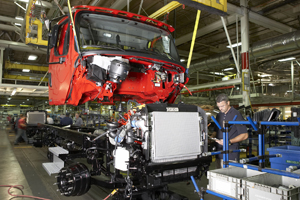UAW Ratifies 4-Year Contract at Daimler’s N.C. Truck Plants

Union members at three Daimler Trucks North America manufacturing facilities in North Carolina have ratified a new four-year collective bargaining agreement, the company said May 19.
DTNA and the United Automobile Workers union agreed on a contract that rewards workers for several years of consistently boosting market share and quality production, while increasing the competitiveness of DTNA’s truck manufacturing plants in Cleveland, Mount Holly and Gastonia.
“The new four-year agreement between Daimler Trucks North America and the UAW serves the mutual benefit of our company, valued workers and retirees,” said Martin Daum, DTNA’s CEO.
“The ongoing close collaboration with the UAW has resulted in a contract that will help assure [DTNA’s] continued manufacturing excellence and market leadership,” he said in a statement.
Daimler sells the Freightliner and Western Star brands in North America, as well as the Detroit brand of diesel engines, transmissions and axles.
Cleveland is the largest U.S. manufacturing plant for Freightliner Trucks, DTNA’s largest truck brand. Workers at the plant, which opened in 1989, make Cascadias and other Class 8 Freightliner models.
The contract includes a $7,000 ratification bonus and 3% wage increases the first and third years of the agreement, with 3% lump-sum bonuses in the second and fourth years. Other gains include an increased night-shift premium and an attendance bonus program.
Faced with the increasing cost of providing health care benefits to retired workers, the union and company also worked to establish a voluntary employee benefit association to secure long-term retiree benefits.
The contract, including that agreement for future retirees, becomes effective upon Daimler’s supervisory board approval. Upon court approval, current retirees also will be included in the employee benefit package, and DTNA will provide additional funding.
“The UAW is thankful to have this collaborative relationship” with DTNA, said Gary Casteel, director of UAW’s Region 8, which has responsibility for DTNA’s facilities in the South.
“Instead of walking away from its responsibility to its retirees, [DTNA] stayed at the table with the UAW until we found a solution to a problem that is plaguing our nation, and retirees . . . will have a brighter future as a result,” Casteel added.




